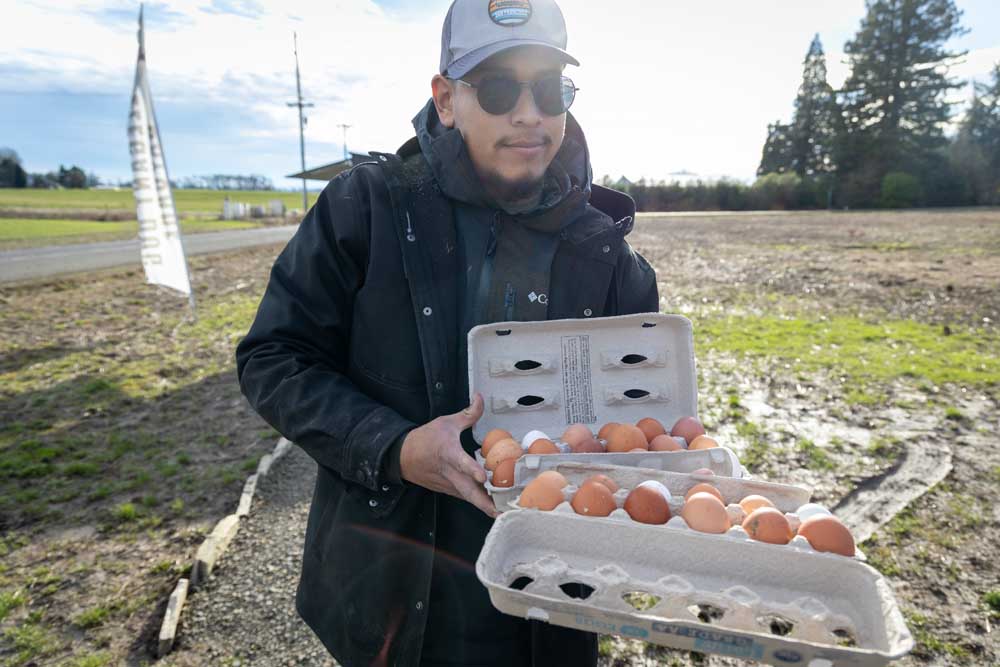Cracking the case: Local farmers stopgap for egg prices, supply amid bird flu outbreaks
Published 5:00 am Saturday, January 18, 2025

- Armando Victoria, who sells local produce in Helvetia, has noticed more customers in light of recent grocery egg price spikes, and despite health concerns over the spread of bird flu.
It’s the start of the new year, and everyone’s set on cracking the question: Why are eggs so expensive?
Trending
Prices for the grocery staple have soared across the country, with the national average spiking around 38% over a year, the Associated Press reported — including an 8.2% increase from November to December.
Portland area shoppers and restaurants are scrambling to keep up with the increases. That’s especially true for restaurants that serve breakfast. An informal survey of four in Southwest Portland found different responses. One has switched to buying their eggs from Costco because its prices are among the lowest. Another has stopped serving free eggs and is using Liquid Eggs instead. The third has added a $2 surcharge to all egg dishes. The last is concerned but had not yet decided what to do.
And prices in Portland grocery stores varies greatly. In one 24-hour period, Tribune staff found eggs at a Fred Meyer store ranging from $7.49 to $10.29.
Trending
A Zupan’s store had an even wider array, anything from $5.29 to $9.99, unless you wanted to shell out $12.24 for organic eggs.
And two different Trader Joe’s showed the value of buying in bulk: Both had eggs for $3.49 per dozen, with no other price options at either location.
Like most things, the problem doesn’t boil down to a single answer. Egg prices often become volatile during the seasonal surges of baking, not to mention the rippling impacts of inflation tacking on costs for feed, fuel and labor.
But what many researchers have labeled as the main culprit in the nationwide grocery dilemma is the Highly Pathogenic Avian Influenza — otherwise known as bird flu.
In the past few weeks, the disease has decimated 95 commercial and backyard flocks, with 10.35 million birds affected, according to data from the U.S. Department of Agriculture’s Animal and Plant Health Inspection Service.
Since the outbreak emerged in 2022, three commercial flocks, 42 backyard flocks and more than 900,000 birds in Oregon have fallen ill to the disease — reducing supply and driving up prices.
Small farms stepping up
With egg prices climbing and concerns over bird health growing, what does that mean for local farms?
Selling eggs started as a small gesture for Katie Christensen, who runs Muddy Feet Farm from her home on the cusp of Hillsboro and Scholls. The family operation, now four years old, hatched as their chickens laid more eggs than they could use.
“I wanted chickens, and I wanted to provide eggs for our community. That’s the main thing, and it’s fun to sell them,” Christensen said. “We ended up with more chickens than we thought we were going to because we just kept hatching more, which leads to lots of eggs in the summertime.”
While some grocery store varieties are marked as high as $8 per dozen, Christensen remains committed to her $5 price point.
“I wanted to be able to provide eggs for people who can’t afford the $12-a-dozen eggs; I want to be able to provide for lower income people,” Christensen said.
Around 100 chickens, seven ducks and three guinea fowl roam around enclosed by fencing in Christensen’s backyard, and ongoing talks of bird flu are worrying, she admitted.
“It’s always a concern in the back of my head,” Christensen said.
Bird flu, according to the U.S. Centers for Disease Control and Prevention, spreads through a number of avenues, including direct contact with infected birds’ saliva, mucus or feces, as well as contaminated surfaces, water and feed.
To minimize risk, Christensen explained that her family avoids feeding wild birds that could spread the flu. Humans also can drag in the virus, which is why the family has a “closed farm.”
“We don’t get visitors, and that’s a huge risk when people bring pathogens on their shoes or their clothes and visit other farms,” she said.
Even with the ongoing issues, Muddy Feet Farm already deals with high demand during the winter months when production is low — but other local operations have noticed an increase in traffic.
Armando Victoria, whose family sells eggs and honey off of Groveland and West Union roads in Helvetia, acknowledged the recent uptick in egg seekers.
“My customers have been rising in the last two months,” Victoria said. “Eggs get expensive because they had to sacrifice a lot of chickens in California and here in Oregon, because of the (bird flu).”
Victoria and his family have relied on home remedies, and other than threats from natural predators, the local operation has not experienced any harm to their flock of around 300 birds.
As outbreaks continue to raise fears about commercial products, Victoria believes consumers are turning to local farmers for reassurance.
“There is a high demand for eggs right now because of (bird flu), and also because the people are worried about their health, they prefer to get eggs from farmers,” he said.
The Department of Agriculture anticipates egg supplies could take some time to replenish, with prices forecasted to rise in 2025.
“I wanted chickens, and I wanted to provide eggs for our community. That’s the main thing, and it’s fun to sell them.”
Katie Christensen, Muddy Feet Farm, Washington County



